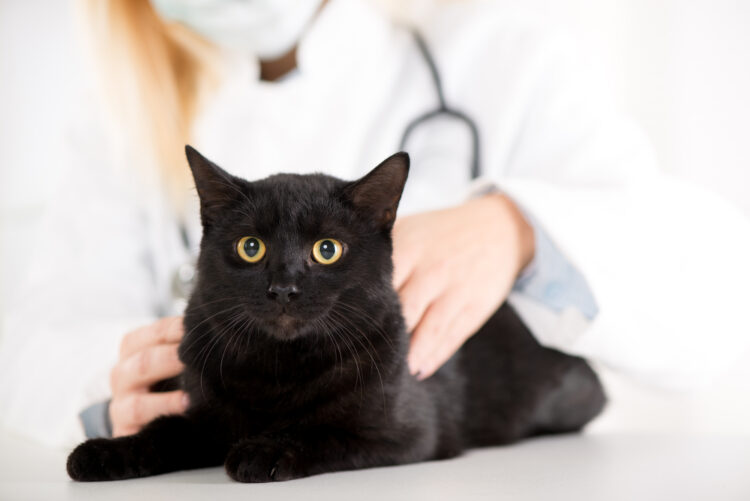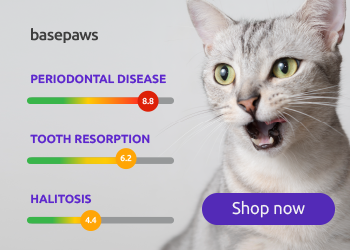
During a routine veterinary exam, your vet will perform a thorough head to tail physical examination of your cat. Depending on your cat’s age, he may also recommend routine blood and urine testing. If you brought your cat to the vet because of a health issue, your vet may recommend additional diagnostic testing, such as x-rays and ultrasound to determine the nature of your cat’s illness.
Diagnostic testing for cats doesn’t end with these, by now, fairly routine tests. Veterinary medicine has advanced over the last few decades and tests such as MRI’s, CT scans, endoscopies and others are no longer the prerogative of human medicine.
Learning that your cat may need diagnostic testing can be overwhelming. While some tests are painless (x-rays, ultrasound) or minimally invasive (blood draws and urinalysis), they may still cause considerable stress to some cats. Other tests may involve sedation or even anesthesia. The following questions can help you decide whether to pursue diagnostic testing for your cat.
Routine diagnostics
Most vets recommend annual testing for cats seven years and older, and, depending on a cat’s health history, annual or bi-annual testing for senior cats over the age of eleven. Typically, your vet will run a blood chemistry panel, a complete bloodcount and a thyroid function test. It’s also a good practice to get one time bloodwork for a young healthy cat so you have a baseline for future comparison. Urinalysis is recommended for cats seven years or older. I believe that a baseline test and routine blood testing according to your cat’s age are important. I recommend these tests unless they would cause undue stress for your cat.
Pre-anesthetic bloodwork
It is critically important that every cat, regardless of age, has complete bloodwork done before undergoing any kind of anesthetic procedure, even a routine dental cleaning. Pre-anesthetic testing will be required by every reputable vet clinic. If it’s not, find a new vet.
Diagnostics when your cat is ill
For cats who present with symptoms, your vet will want to run a complete blood panel at a minimum. Depending on your cat’s symptoms, your vet may also want to perform a urinalysis, x-rays and/or ultrasound.
How to decide which diagnostics are right for your cat
Anytime your vet recommends diagnostics, make sure you have a thorough understanding of why a particular test is needed, and what the results may tell you. Don’t be afraid to ask questions.
How risky is the procedure?
Does the procedure require sedation or anesthesia? While anesthesia can be safely tailored even to cats with medical conditions, no anesthetic procedure is without risk. Discuss the risks of the procedure vs. the benefits with your vet before you agree give your consent.
Are finances a concern?
Diagnostic tests are expensive. If finances are a concern, be honest about it with your vet. There may be alternative tests that will also yield answers about your cat’s condition. A good vet will always recommend the optimal course of diagnosis and treatment, but will work with you to determine whether there are other less expensive options.
What will you do with the information from the test?
This is the most important question to ask, and the answer will be different for every cat and every cat parent.
Let’s say your cat is being tested for cancer. If the test comes back positive, would you be willing to put your cat through chemotherapy or surgery, or would you opt for palliative care? Is your cat comfortable with frequent vet visits if that’s what treatment would require?
Dr. Andrea Tasi, a homeopathic feline house call veterinarian and owner of Just Cats Naturally, frequently has discussions about whether or not to pursue diagnostic tests with her clients. “A typical example I can come up with is a cat with a significant heart murmur on exam and an elevated proBNP blood test. It’s very likely that this cat has heart disease.” The client’s regular vet recommends a cardiology consult with an echocardiogram, EKG, and blood pressure measurements. “The cat is completely impossible to give any medication to, will not allow pilling, will not allow topical medications, and only eats dry food so mixing something in with food won’t work, either,” says Dr. Tasi. “And the cat gets very very stressed by any trip to vet.” Is it worth doing the cardiac workup? “In this case, no,” says Dr. Tasi. “The owner understands that the cat may go into congestive heart failure, develop a blood clot, or even die from a sudden cardiac event. Of course, “the cat might do any of these things even if treated with cardiac medications,” adds Dr. Tasi.
Deciding not to pursue diagnostics or treatment can be a difficult decision for many cat parents. We all bring our own experiences with illness and treatment to the table. We may have had a negative (or positive) experience with a different cat than the one we’re trying to make a choice about in the past. Even experiences with illness of a human family member or friend can influence this process. Personal opinions and even spiritual beliefs can also play a role in determining what we are willing to do for our cats.
My personal experience with making decisions about diagnostics
When my first cat Feebee got sick, I was already working in veterinary hospitals. Back then, my approach was that if something could be done, it should be done. I put him through a lot of tests: x-rays, ultrasounds, endoscopies and multiple chest taps. When his lymphoma diagnosis was confirmed, I opted for chemotherapy. After seven months of fairly good quality of life, I decided against further aggressive treatment when it became evident that the chemo had stopped working. He died while his vet was on her way to my house to euthanize him.
When Amber got sick, I put her through a lot of diagnostic testing, along with a three-day hospital stay in intensive care. Even thirteen years later, I can still barely think about the last two weeks of her life without breaking down. I doubt that I would ever put another cat through what I put her through.
When Ruby got sick, her physical exam findings and bloodwork results suggested advanced kidney failure. The only way to know for sure what was going on with her kidneys would be via further testing. If an ultrasound showed a growth or cyst on her kidney, it would most likely have required surgical removal. If it looked like cancer, it would have meant getting a biopsy, possibly followed by surgery and/or chemotherapy. And while surgery and chemo might have been right for another cat, I knew in my heart that they were not right for Ruby. Not only did she get terribly stressed even just during Dr. Tasi’s home visits, the few times she had to go to a clinic, we had issues with non-recognition aggression between her and Allegra when she came home, which would have only added to the levels of stress we were all dealing with at the time.
I am blessed that in Dr. Tasi, I have a vet who treats the patient, not the lab values. Having my veterinarian support my decision to forego aggressive diagnostics and treatment made an agonizing decision bearable. Unlike with Feebee and Amber, I never second-guessed myself about the decisions I made for Ruby.
I want to stress that there is no right or wrong answer. Each cat is an individual, as is each cat parent. Your best approach is to discuss any concerns or misgivings you have about diagnostic tests with your veterinarian so that together, you can make the best possible decision for your cat and for you.
Image Depositphotos









Thank you for sharing this. I have three cats, each very different from one another. My youngest cat unfortunately was diagnosed with kidney disease (early stages) – she will be 4 in March. Thankfully I found a vet who has taught me to give her daily sub Q fluids. I can’t imagine doing this with my other cat if he was given such a diagnosis, so your post really resonates with me especially as I will have decisions to make in the future with my youngest kitty as I navigate KD.
I’m sorry about your youngest, Kirstyn. Best wishes for a long life for her!
Ingrid,
Thank you for sharing the dx journey.
We’ve been navigating this path of diagnostic testing with our beloved 15-1/2 year old for the past year. In November we moved forward with a CT scan$$ in hopes of finding answers to why chronic sinus infections were not fully resolving with various courses of antibiotics. Thankfully, it showed no indication of foreign obstruction.
It took him two days to recover his normal joyful, talkative demeanor.
A rhinoscopic endoscopy with biopsies is more invasive, requiring longer anesthesia, so we chose rx steroid inhaler treatment. After three weeks, the symptoms are still unresolved.
We’re on the precipice.
I’m sorry, Amy, I know it’s so hard. Best wishes for you and your kitty.
Thank you, Ingrid. >^••^<
Where are the vets that do the electro-acupuncture-by-Voll scanning — totally non-invasive and able to see which organs have a weak level of energy, or signs of a developing auto-immune malfunction, or everything is fine… Long before the organs reach failure….
So far I’ve seen research that shows the device for humans does work on dogs — so likely on cats, in lab research… but it may require some messing with fur to have located the acupuncture points.. But once you know where those are, surely we could even do it at home… The device for humans is there on amazon..
For the humans there is a book by a homeopathic doctor Grigorova who had catalogued hundreds of cases that she used this device for diagnosing what would work for what readings at what acupuncture points…
Surely that srt of possibility is worth researching but it will likely take crowd-funding to get it done… Real preventive medicine.
TTYL
Dr. Tasi sounds wonderful. My vet is similar, he is always honest with me.